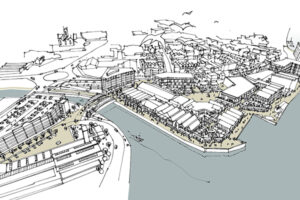By Imre-Gustav Vellamaa
Whether we like it or not, environmental, social, and governance (ESG) takes an increasingly important role in our personal and business life. Thus, there are two options in the longer run: to adopt or disappear. If we choose adopting, and I guess we do, we are faced with another big question – how to achieve ESG goals?
Sure, every aspect of ESG involves several sub-aspects. So, there is a need to choose where to start from. I would focus on two ESG aspects connected to commercial buildings: energy efficiency & carbon emissions (environmental) and health & safety (social) since I have more experience in these sectors.
Energy savings (and CO2 emission reduction) is a piece of cake. You can turn everything off and save even 100% of energy and reduce 100% CO2 emission as well. But of course, all the people would flee from you, because it would lose all the indoor comfort and health aspects as well. So, the main question is how to save energy and increase indoor comfort at the same time.
Indoor climate complaints together with very high sustainability goals were the main reasons why Swedbank Estonia HQ in Tallinn was ready to start the building’s HVAC systems’ management with a new unique artificial-intelligence-based software solution, R8 Digital Operator, some years ago. Swedbank became one of the two first clients in the world using R8 Digital Operator.
For the first step a full data-based HVAC-system diagnostics was completed and inspite of very strong technical team and facility management partner many more and less important faults were detected and turned into tasks. In the next step, HVAC autonomous control was added. As a result, thousands of HVAC system setpoints’ changes were made every month according to three main KPIs: energy efficiency, indoor comfort, and the building’s technical condition.
Thererfore, a lot of time and human energy was saved and Swedbank’s technical team could focus more on issues where people need to act, leaving the rest to artificial intelligence. But most importantly, the number of complaints has been reduced remarkably; unfortunately, there are no statistics available but a similar project in Paris, France reported a 69% reduction of complaints regarding indoor climate. It is probably interesting – new? – to know that indoor climate quality can be measured by actual data as well, not just by the usual subjective questionnaires. The more demanding the tenants are the more important this is.
And finally, 1,050 tons of reduced CO2 emissions and over 130.000 euros of energy savings over a four-year period. All with 0 euros investment. Sure, replacing a broken pump or invalid sensor etc. is not included here. Modern premium-class buildings have everything they need, in most cases. It is just about how to increase the efficiency to a level that is available inside the already existing systems but cannot be achieved by automation systems with human teams alone.
Sure, we have to mention about Covid-19 as well. In 2020 and also in 2021 the number of Swedbank’s employees working in their Tallinn headquarter offices has decreased strongly. And this situation has reduced the amount of human body heat and exhaust heat from computers– therefore, more heating is needed for colder periods and less cooling is needed for warmer periods. Also, ventilation units have been turned on not just for working hours but for much longer time periods, including the weekends, to minimize Covid-19 risks. The Federation of European Heating, Ventilation and Air Conditioning Associations (EHVA) Covid-19 Guidance is followed strictly in the Swedbank Headquarter in Tallinn, Estonia.





